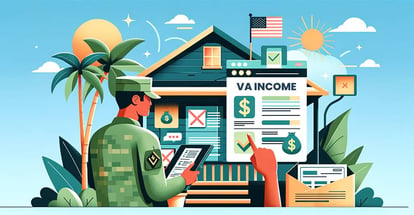Florida VA Loan Limits | Every County | Updated for 2025
The newly released 2025 VA loan limits have been increased and adapted to benefit military veterans and service members. A major change is that now, due to legislative changes, VA loan limits no longer apply to many borrowers.
Here's an updated look at the VA loan limits and rules:
In this article (Skip to...)
The VA Loan Limits in Florida in 2025
VA loans are special because you don't have to make a down payment or pay for private mortgage insurance, which can save you a lot of money.
By not requiring a down payment, VA loans can save you up to 20% of the home's price upfront, commonly ranging from $30,000 to $60,000 on a $300,000 home, and by not needing private mortgage insurance, you could save an additional $30 to $70 per month, totaling $10,800 to $25,200 over the life of a 30-year loan.
In 2025, the VA loan limits for Florida vary depending on the county:
For Monroe County, the loan limit is set at $986,135.
For all other areas in Florida, the limit is $813,635.

Do All Florida Veterans Have VA Home Loan Limits?
No, in 2025, not all Florida veterans have VA home loan limits. The presence of loan limits depends on whether you have full entitlement or partial entitlement:
Veterans with Full Entitlement
You do not have any loan limits if you have full entitlement, including veterans who have never used their home loan benefit or have paid off a previous VA loan in full and sold the property.
This allows you to borrow without a cap on the loan amount, potentially enabling you to purchase homes without needing to make a down payment, regardless of the home's price.
Veterans with Partial Entitlement
You are subject to loan limits if you have partial entitlement, such as having an existing VA loan or not repaying a previous VA loan in full.
These limits are based on FHFA-defined county loan limits. For 2025, in Florida, this means a limit of $986,135 in Monroe County and $813,635 in all other areas.
Therefore, whether you have a VA home loan limit depends on your entitlement status and, for those with partial entitlement, the specific county in which you buy a home.
Most Common Questions about VA Loan Limits in Florida
Is there a maximum loan amount for VA loans?
Not exactly.
There are no loan limits for veterans with full entitlement; they can borrow as much as the lender approves based on their financial situation. However, veterans with partial entitlement are subject to loan limits based on the county in which the property is located.
How much is the 2025 VA loan limit for my county?
The VA loan limits vary by location. In most areas of Florida, the standard limit is $813,635, but in high-cost areas like Monroe County, the limit increases to $986,135. To find the specific limit for your county, you can check the VA website or use an online VA loan limit calculator.
Do I need a down payment with a VA loan?
It depends on your entitlement. If you have full entitlement and the purchase price doesn't exceed the lender's appraised value of the home, you typically do not need a down payment. A down payment may be required for those with partial entitlement if the loan amount exceeds the county's loan limits.
How does my remaining entitlement affect the limit?
If you have reduced entitlement, the VA loan limit can impact how much you can borrow without needing a down payment. Your remaining entitlement and the county loan limit together determine the maximum loan amount you can secure without a down payment.
What happens if the house price is more than the limit?
If the house's purchase price exceeds the applicable VA loan limit and you have partial entitlement, you will likely need to make a down payment to cover the difference. This helps ensure that the loan amount does not exceed the VA guarantee.
Where can I find the official VA loan limits?
The official VA loan limits are on the Department of Veterans Affairs website. This site provides up-to-date information on VA loan limits for each county.
Are VA loan limits the same every year?
No, VA loan limits are adjusted annually. These adjustments are based on changes in the housing market and are intended to reflect the current real estate environment.
Does the VA loan limit apply to the purchase price or loan amount?
The VA loan limit applies to the loan amount, not the house's purchase price. This limit affects how much you can borrow with a VA guarantee without needing a down payment.
Can I use a VA loan to buy a house exceeding the limit?
Yes, it's possible to use a VA loan to buy a house exceeding the loan limit if you have the financial means to make a down payment. This down payment must cover the difference between the loan limit and the purchase price.
Even if I qualify based on limits, are there other factors considered?
Yes, even if the loan amount is within the VA loan limits, lenders will still evaluate your credit score, income, debt-to-income ratio, and other financial factors to determine your eligibility for a VA loan.
VA Loan Application Process
-
Check Eligibility: Confirm that you meet the service requirements for a VA loan. You can do this quickly online at the VA’s eBenefits portal.
-
Obtain Your COE: Request your Certificate of Eligibility (COE) through the VA’s eBenefits portal. This proves to lenders that you qualify for a VA loan.
-
Find a Lender: Choose a VA-approved lender. Banks, credit unions, and mortgage companies like MakeFloridaYourHome offer VA loans.
-
Get Pre-Approved: Apply for pre-approval to find out how much you can borrow. This involves providing your financial information to the lender.
-
Find a Home: Search for a home that meets your needs and fits within the loan amount you are pre-approved for.
-
Sign a Purchase Agreement: Once you find a home, make an offer and sign a purchase agreement contingent on approval of your VA loan.
-
Complete Lender Application: Fill out a loan application with your lender. They will process your application and order a VA appraisal.
- Close the Loan: Attend the closing of your loan, where you will sign all the necessary paperwork, finalize the loan, and take ownership of your home.
Bottom Line
VA loan limits in Florida vary based on your entitlement status and location. If you have full entitlement, there's no upper limit on the amount you can borrow without a down payment, giving you great flexibility in your home purchase.
For those with partial entitlement, limits apply based on the county—$986,135 in Monroe County and $813,635 in all other areas for 2024. Understanding these limits can help you plan effectively for your home-buying journey.
Ready to explore your VA loan options in Florida?
Visit MakeFloridaYourHome for expert guidance and resources on navigating the VA loan process smoothly and making your dream home a reality.
With over 50 years of mortgage industry experience, we are here to help you achieve the American dream of owning a home. We strive to provide the best education before, during, and after you buy a home. Our advice is based on experience with Phil Ganz and Team closing over One billion dollars and helping countless families.

About Author - Phil Ganz
Phil Ganz has over 20+ years of experience in the residential financing space. With over a billion dollars of funded loans, Phil helps homebuyers configure the perfect mortgage plan. Whether it's your first home, a complex multiple-property purchase, or anything in between, Phil has the experience to help you achieve your goals.


 By
By  Edited by
Edited by 





